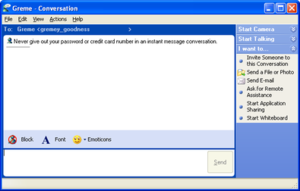Windows Messenger
This article needs additional citations for verification. (April 2009) |
 A conversation in Windows Messenger 4.7.2009, with sidebar and toolbar enabled. | |
| Developer(s) | Microsoft |
|---|---|
| Initial release | 22 October 2001[1][2] |
| Stable release | 5.1.0715
/ 12 August 2008[3] |
| Operating system | Microsoft Windows |
| Successor | Windows Live Messenger |
| Website | microsoft.com/windows/messenger (archived August 2003) |
Windows Messenger is a discontinued instant messaging client included in Windows XP.[1][4] Designed for use by both corporate and home users, it was originally created, in 2001, as a streamlined and integrated version of MSN Messenger.[5] It was upgraded several times when it was made available for Windows 2000 and Windows Server 2003.[6] Since then, its development stopped.[3][7] It was superseded by Windows Live Messenger and Microsoft Lync.[8][9]
Overview[]
Windows Messenger was introduced in Windows XP on 22 October 2001.[1][5][10][11] It is enabled by default.[12] Its features include instant messaging, presence awareness, support for Session Initiation Protocol (SIP), file transfer, application sharing and whiteboarding.[13] Later versions added "ink" support and integration with Microsoft Lync Server (formerly Microsoft Office Communications Server). Windows Messenger's user interface is devoid of the clutter seen in Windows Live Messenger. Winks, nudges, and custom emoticons are unavailable, and the main user interface more closely resembles the standard Windows XP Luna style.[14]
Windows Messenger integrates with Microsoft Exchange Server, Microsoft Outlook, Outlook Express, Remote Assistance and Windows Media Center in Windows XP. Windows Messenger can communicate with the Exchange Server 2000's Instant Messaging Service and Microsoft Messenger Service. Interoperability with third-party software is exposed through a COM API called the Real Time Communications (RTC) Client API.
Development of Windows Messenger was halted after version 5.1 in favor of Windows Live Messenger and Microsoft Lync.[3][7][8][9]
See also[]
- Comparison of instant messaging clients
- Comparison of instant messaging protocols
References[]
- ^ a b c "Messenger now officially available for Windows XP". Neowin. 22 October 2001. Retrieved 12 August 2020.
- ^ ".NET Messenger Service - Features". 28 October 2001. Archived from the original on 2001-10-28. Retrieved 12 August 2020.
- ^ a b c "How to obtain the latest version of Windows Messenger 5.1". 12 August 2008. Archived from the original on 2 August 2019. Retrieved 11 August 2020.
- ^ "Windows XP launched in three editions". afaqs!. 27 October 2001. Retrieved 12 August 2020.
- ^ a b "Microsoft has a new message for Win XP". ZDNet. 11 October 2001. Retrieved 12 August 2020.
- ^ "Get Windows Messenger 5.0". Microsoft. 2 October 2003. Archived from the original on 2003-10-02. Retrieved 11 August 2020.
- ^ a b "Microsoft Security Bulletin MS05-009 - Critical". docs.microsoft.com. 8 February 2005. Retrieved 11 August 2020.
- ^ a b "MSFT Annual Report 2006". www.microsoft.com. Retrieved 11 August 2020.
- ^ a b "Microsoft Previews New Windows Live and Office Live Services". Stories. 1 November 2005. Retrieved 11 August 2020.
- ^ "CNN.com - Sci-Tech - Microsoft to embed Messenger in Windows XP". edition.cnn.com. 8 June 2001. Retrieved 11 August 2020.
- ^ "Windows Messenger Update for Windows XP to Enable Consumers To Make PC-to-Phone Calls". Stories. 11 October 2001. Retrieved 11 August 2020.
- ^ "Disable/Uninstall Windows Messenger in Windows XP – Smallvoid.com". Retrieved 7 August 2019.
- ^ ".NET Messenger Service - Features". 28 October 2001. Archived from the original on 2001-10-28. Retrieved 12 August 2020.
- ^ "Windows Messenger Tweaked for XP Launch". BetaNews. 12 October 2001. Retrieved 14 August 2020.
Further reading[]
- "How to obtain the latest version of Windows Messenger 5.1". Support (4.0 ed.). Microsoft. 12 August 2008. Archived from the original on 25 October 2008. Retrieved 23 April 2009.
- "How to prevent Windows Messenger from running on a Windows XP-based computer". Support (9.0 ed.). Microsoft. 2 July 2010. Archived from the original on 24 July 2010.
- "Windows Messenger 5.1: Windows Messenger vs MSN Messenger: What's the Difference?". Download Center. Microsoft. 5 April 2005. Archived from the original on 10 September 2012.
- Windows-only freeware
- Windows-only instant messaging clients
- Windows components
- Windows instant messaging clients
- Freeware
- Discontinued Windows components